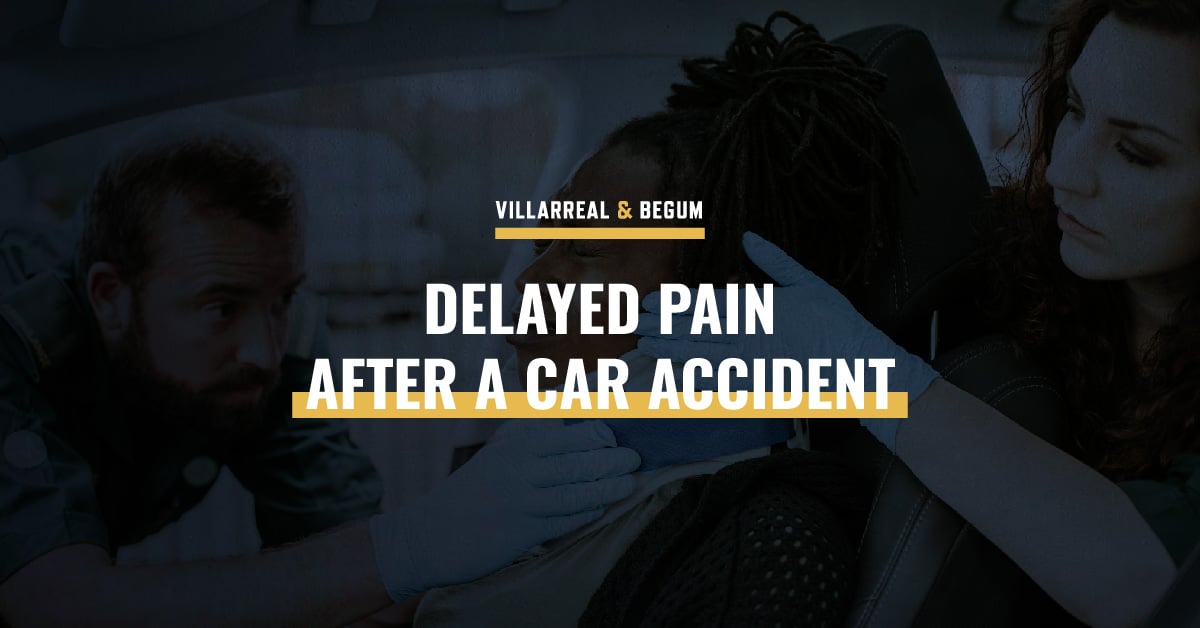Car accidents are an all-too-common occurrence on Texas roads. While some of them cause injuries ranging in severity from minor bruises to spinal cord damage and traumatic brain injury, in other instances people walk away feeling unscathed, only to find themselves grappling with pain and discomfort days or even weeks later. This phenomenon, known as delayed pain, can have a serious impact on one’s health and well-being.
The immediate rush of adrenaline and shock following a collision can often mask pain signals, leading to the misconception that no immediate pain equates to no injury. However, this is far from the truth. Delayed pain can indicate underlying crash injuries that, if left unaddressed, may lead to long-term health issues. In this blog, we explore its causes, common symptoms, and the importance of seeking advice from a Texas car accident lawyer.
The Reality of Delayed Pain
Delayed pain after a car accident occurs when you don’t immediately experience discomfort, pain, or symptoms following an incident. Instead, these symptoms emerge hours, days, or even weeks later.
This delay is primarily due to the body’s initial response to stress and trauma. In the moments following an accident, the body often releases adrenaline and endorphins, which can act as natural painkillers and temporarily mask pain signals. As the immediate effects of these substances wear off, the real extent of the accident injuries can become painfully apparent.
Several types of injuries commonly result in delayed pain, highlighting the need for vigilance and attention to one’s body after a motor vehicle accident:
- Whiplash: Perhaps the most well-known injury associated with delayed pain, whiplash occurs when the force of a crash causes the head to snap rapidly back and forth. This violent motion can injure the muscles, ligaments, and tendons in the neck, but the full extent of the injury may not be felt until inflammation sets in days later and you feel neck pain.
- Internal Injuries: Internal bleeding or damage to internal organs may not be immediately apparent. Symptoms such as abdominal pain, chest pain, dizziness, or fainting can indicate severe injuries that require urgent medical attention.
- Concussions: A concussion is a type of traumatic brain injury. The symptoms include headaches, confusion, dizziness, blurred vision, and memory loss, all of which can be delayed.
If you start to notice any new or worsening symptoms, it’s important to seek medical evaluation promptly. Doing so not only supports your health and recovery but also ensures that any related insurance or legal claims accurately reflect the impact of the accident on your well-being.
Common Types of Delayed Pain Symptoms
Recognizing the common types of delayed pain symptoms is an important step in seeking timely medical attention and supporting your recovery process. Here are some common injury symptoms that may not appear immediately but indicate the need for a complete evaluation:
- Neck or Shoulder Pain and Stiffness: Often associated with whiplash and soft tissue injuries, pain, and stiffness in the neck or shoulders might emerge hours or days after the accident. This can signify muscle, tendon, or ligament damage that was not immediately noticeable due to adrenaline’s effects.
- Back Pain: Delayed back pain can indicate a variety of issues, including sprains, herniated disks, or other spinal injuries. Such pain should not be ignored, as it can signal trauma to the spinal column or muscles.
- Numbness or Tingling in Extremities: Experiencing numbness or a tingling sensation in your arms, hands, legs, or feet can be a sign of nerve damage or a spinal injury. These symptoms might start to appear as the initial shock of the accident wears off.
- Abdominal Pain or Swelling: These symptoms can be particularly concerning as they may indicate internal bleeding or organ injury. Abdominal pain or swelling that develops after an accident should be treated as a medical emergency.
- Headaches or Dizziness: While headaches can have many causes, their delayed onset after a car accident can point to concussion, blood clot, or neck injury. Dizziness can also accompany these conditions, signaling the need for immediate medical attention.
- Emotional or Cognitive Disturbances: Changes in mood, memory, concentration, or sleep patterns can be symptoms of a traumatic brain injury or emotional distress following an accident. These emotional injuries may surface after the physical symptoms have been addressed or might be the first indication of a deeper issue.
If you experience any of these delayed symptoms after a car accident, seek medical care right away. A healthcare professional can assess your symptoms, provide a diagnosis, and recommend the appropriate treatment plan to help you recover.
The Importance of Seeking Medical Attention
Delayed medical care can have a profound impact on your health. Injuries left undiagnosed and untreated can lead to chronic pain, delayed healing, and, in some cases, irreversible damage. Early intervention, on the other hand, can mitigate these risks, providing an opportunity for treatments that can reduce severe pain, improve function, and promote healing. This proactive approach ensures that your health is prioritized and that you are on the most effective path to recovery.
The timing of your medical care can also affect the strength and validity of any legal claims related to the accident. Insurance companies often scrutinize the gap between the accident and the onset of treatment. A delay in seeking medical attention can be misconstrued as an indication that the hidden injuries were not serious or, in some cases, unrelated to the accident. Prompt medical evaluation not only solidifies the link between the incident and your injuries but also provides documented evidence supporting your personal injury claim.
Documenting Your Injuries for a Personal Injury Claim
Medical records are cornerstone evidence in personal injury claims. These documents provide a credible, detailed account of:
- Your injuries
- The treatment you received
- The impact those injuries have had on your life
They offer objective evidence that can directly influence the assessment of your claim and the compensation you may be entitled to receive.
Tips on Documenting Symptoms and Medical Visits
Documenting your symptoms and medical visits will strengthen your personal injury claim. Consider these tips:
- Keep a Detailed Journal: Start a journal as soon as possible after the accident. Record your symptoms, pain levels, and how the injuries impact your daily activities. Note any difficulties you experience, such as sleeping problems, inability to perform certain tasks, or emotional distress.
- Save All Medical Documentation: Collect and organize every piece of medical documentation related to your accident, including emergency room records, doctor’s notes, prescription receipts, physical therapy records, and any other medical reports. These documents provide a timeline and severity of your injuries.
- Follow Up on All Treatments: Adhere to all recommended medical treatments and follow-up appointments. Documenting your compliance with medical advice not only aids in your recovery but also strengthens your claim by showing your commitment to healing.
- Record Expenses: Keep a detailed record of all expenses related to your injury, including medical bills, travel expenses to medical appointments, and any other costs incurred due to your injury. This documentation will be crucial for seeking reimbursement.
- Communicate with Your Healthcare Provider: Inform your healthcare provider about all symptoms and challenges you face due to your auto accident injuries. Clear communication ensures that your medical records accurately reflect the extent of your injuries and their impact on your life.
This detailed documentation not only serves as vital evidence for your case but also helps ensure that you receive the financial compensation necessary for your recovery and rehabilitation. Remember, thoroughness and accuracy in documenting your injuries are key to advocating for your rights and well-being.
How Can a Texas Car Accident Lawyer Help?
After experiencing a car accident, the last thing you want to do is fight for the financial compensation you need to cover your medical bills, lost income, property damage, and other financial losses. A personal injury attorney brings a wealth of knowledge and experience in Texas car accident laws and can help interpret how they apply to your case.
Other advantages include:
- Claim Evaluation: An experienced personal injury lawyer can evaluate the merits of your claim, helping you understand your rights and the potential outcomes. They can also assess the full extent of your damages and advise on the compensation you might be entitled to.
- Negotiation with Insurance Adjusters: Insurance companies are often focused on minimizing payouts. A skilled attorney can negotiate on your behalf, ensuring that your claim is taken seriously and that you receive a fair settlement that covers your medical expenses, lost wages, and other damages.
- Stress Reduction: Handling a personal injury claim while recovering from an accident can be overwhelming. Having an attorney take on the legal workload allows you to focus on your recovery, knowing that your case is in capable hands.
- Representation in Court: If your case goes to court, a personal injury attorney can represent you and advocate for your rights.
Here are key factors to consider when choosing a car accident attorney:
- Experience: Look for an attorney with experience in handling car accident and personal injury claims in Texas. Their familiarity with similar cases can be a significant advantage.
- Reputation: Consider the lawyer’s reputation in the legal community and among past clients. Reviews and testimonials can provide insight into their success rate and client satisfaction.
- Communication: Your attorney should be accessible and willing to keep you informed throughout the process. Clear and regular communication is essential for a trusting attorney-client relationship.
- Compassion: A good personal injury attorney understands the emotional and physical toll of an accident and approaches your case with empathy and support.
Most personal injury attorneys work on a contingency fee basis, which means they only get paid if your lawsuit succeeds. This arrangement reduces financial pressure and can provide peace of mind while your claim is being resolved.
Get a Free Consultation From a Texas Car Accident Lawyer
After a car accident, it’s important to remain vigilant for signs of delayed pain, which can mask significant injuries. Recognizing and addressing these symptoms promptly is not only vital for your immediate health but also for your long-term recovery.
If you or a loved one has been involved in a car accident and is experiencing delayed pain symptoms or facing challenges with your personal injury claim, we invite you to reach out to the Villarreal & Begum, LAW GUNS. Your well-being is our priority from the moment your case is filed until you get the accident settlement or verdict you need. Call (210) 800-0000 to schedule your free consultation or contact us online today.

Alex has tried over 50 trials to verdict and tried or settled over five hundred million dollars in cases. Alexander Begum is a founding shareholder of the Villareal & Begum Law Firm. Born and raised in Texas.




